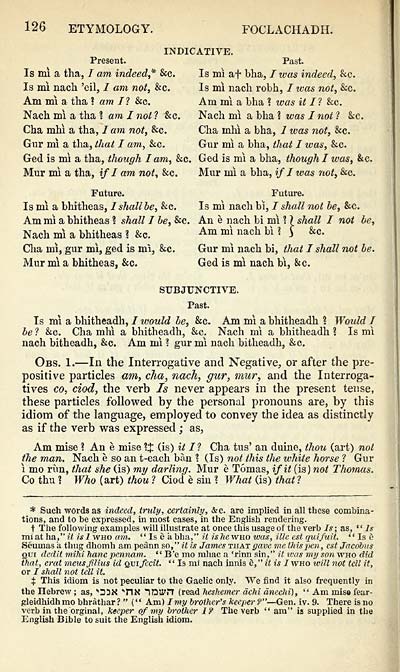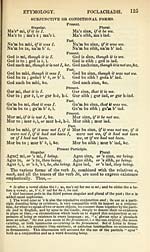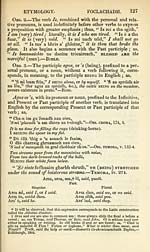Books and other items printed in Gaelic from 1841 to 1870 > Stéidhean a' Ghràmair Ghaëlig
(154) Page 126
Download files
Complete book:
Individual page:
Thumbnail gallery: Grid view | List view

126 ETYMOLOGY.
FOCLACHADH.
INDICATIVE.
Present.
Is mì a tha, / am indeed,* &c.
Is mì nach 'cil, / am not, &c.
Am mì a tha ? am I? &c.
Nach mì a tha ? am I not ? &c.
Cha mhì a tha, / am not, &c.
Gur mì a tha, that I am, &c.
Ged is mì a tha, thoagh I am, &c.
Mur mì a tha, if I am not, &c.
Future.
Is mi a bhitheas, I shallbe, &c.
Am mì a bhitheas ? shall I be, &c.
Nach mi a bhitheas ? &c.
Cha mì, gur mì, ged is mì, &c.
Mur mi a bhitheas, &c.
SUBJUNCTIVE.
Past.
Is mì a bhitheadh, / would be, &c. Am mì a bhitheadh ? Would I
be ? &c. Cha mhì a bhitheadh, &c. Nach mi a bhitheadh ? Is mì
nach bitheadh, &c. Am mì ? gur mì nach bitheadh, &c.
Obs. 1. — In the Interrogative and Negative, or after the pre-
positive particles am, clia, nacli, gur, mur, and the Interroga-
tives co, ciod, the verb Is never appears in the present tense,
these particles followed by the personal pronouns are, by this
idiom of the language, employed to convey the idea as distinctly
as if the verb was expressed ; as,
Am mise ? An è mise %% (is) it I ? Cha tus' an duine, thou (art) nol
the man. Nach è so an t-each bàn ? (Is) not ' this the white horse ? Gur
ì mo rùn, that she (is) my darling. Mur è Tòmas, if it (is) not Thomas.
Co thu ? Who (art) thou ? Ciod è sin ? What (is) that ?
* Such words as indeecl, truly, certainly, &c. are implied in all these combina-
tions, and to be expressed, in most cases, in the English rendering.
t The following examples will illustrate at once this usage of the verb Is ; as, " Is
mì at ha," it is 1 who am. ' • Is è a bha," it is he who was, ille est quifuit. ' ' Is è
Sèumas a thug dhomh am peànn so," it is James that gave me thispen, est Jacobus
qui dedit mihi hanc pennam. " B'e mo mhac a 'rinn sin," it ivas my son who did
that, erat mcusfilius id Qmfecit. " Is mì nach innis è," it is I who will not tell it,
or / shall not tell it.
X This idiom is not peculiar to the Gaelic only. We find it also frequently in
the Hebrew ; as, S D3K s nK ^IDUTT (read heshemer dchi ànechi), " Am miso fear-
gleidhidhmo bhràthar? " (" Am) Imy brother's keeper?" — Gen. iv. 9. There is no
verb in the orginal, keeper of my brother 1? The verb " am" is supplied in the
English Bible to suit the English idiom.
Is mì a+ bha, / was indeed, &c.
Is mì nach robh, / was not, &c.
Am mì a bha ? was it I? &c.
Nach mì a bha ? was I not ? &c.
Cha mhì a bha, 1 was not, &c.
Gur mì a bha, that I was, &c.
, Ged is mi a bha, thoughl was, &c.
Mur mì a bha, if I was not, &c.
Future.
Is mì nach bì, / shall not be, &c.
An è nach bi mì ? ? shall I not be,
Am mì nach bì ? S &c «
Gur mì nach bi, that I shall not be.
Ged is mì nach bi, &c.
FOCLACHADH.
INDICATIVE.
Present.
Is mì a tha, / am indeed,* &c.
Is mì nach 'cil, / am not, &c.
Am mì a tha ? am I? &c.
Nach mì a tha ? am I not ? &c.
Cha mhì a tha, / am not, &c.
Gur mì a tha, that I am, &c.
Ged is mì a tha, thoagh I am, &c.
Mur mì a tha, if I am not, &c.
Future.
Is mi a bhitheas, I shallbe, &c.
Am mì a bhitheas ? shall I be, &c.
Nach mi a bhitheas ? &c.
Cha mì, gur mì, ged is mì, &c.
Mur mi a bhitheas, &c.
SUBJUNCTIVE.
Past.
Is mì a bhitheadh, / would be, &c. Am mì a bhitheadh ? Would I
be ? &c. Cha mhì a bhitheadh, &c. Nach mi a bhitheadh ? Is mì
nach bitheadh, &c. Am mì ? gur mì nach bitheadh, &c.
Obs. 1. — In the Interrogative and Negative, or after the pre-
positive particles am, clia, nacli, gur, mur, and the Interroga-
tives co, ciod, the verb Is never appears in the present tense,
these particles followed by the personal pronouns are, by this
idiom of the language, employed to convey the idea as distinctly
as if the verb was expressed ; as,
Am mise ? An è mise %% (is) it I ? Cha tus' an duine, thou (art) nol
the man. Nach è so an t-each bàn ? (Is) not ' this the white horse ? Gur
ì mo rùn, that she (is) my darling. Mur è Tòmas, if it (is) not Thomas.
Co thu ? Who (art) thou ? Ciod è sin ? What (is) that ?
* Such words as indeecl, truly, certainly, &c. are implied in all these combina-
tions, and to be expressed, in most cases, in the English rendering.
t The following examples will illustrate at once this usage of the verb Is ; as, " Is
mì at ha," it is 1 who am. ' • Is è a bha," it is he who was, ille est quifuit. ' ' Is è
Sèumas a thug dhomh am peànn so," it is James that gave me thispen, est Jacobus
qui dedit mihi hanc pennam. " B'e mo mhac a 'rinn sin," it ivas my son who did
that, erat mcusfilius id Qmfecit. " Is mì nach innis è," it is I who will not tell it,
or / shall not tell it.
X This idiom is not peculiar to the Gaelic only. We find it also frequently in
the Hebrew ; as, S D3K s nK ^IDUTT (read heshemer dchi ànechi), " Am miso fear-
gleidhidhmo bhràthar? " (" Am) Imy brother's keeper?" — Gen. iv. 9. There is no
verb in the orginal, keeper of my brother 1? The verb " am" is supplied in the
English Bible to suit the English idiom.
Is mì a+ bha, / was indeed, &c.
Is mì nach robh, / was not, &c.
Am mì a bha ? was it I? &c.
Nach mì a bha ? was I not ? &c.
Cha mhì a bha, 1 was not, &c.
Gur mì a bha, that I was, &c.
, Ged is mi a bha, thoughl was, &c.
Mur mì a bha, if I was not, &c.
Future.
Is mì nach bì, / shall not be, &c.
An è nach bi mì ? ? shall I not be,
Am mì nach bì ? S &c «
Gur mì nach bi, that I shall not be.
Ged is mì nach bi, &c.
Set display mode to:
![]() Universal Viewer |
Universal Viewer | ![]() Mirador |
Large image | Transcription
Mirador |
Large image | Transcription
Images and transcriptions on this page, including medium image downloads, may be used under the Creative Commons Attribution 4.0 International Licence unless otherwise stated. ![]()
| Rare items in Gaelic > Books and other items printed in Gaelic from 1841 to 1870 > Stéidhean a' Ghràmair Ghaëlig > (154) Page 126 |
|---|
| Permanent URL | https://digital.nls.uk/101713447 |
|---|
| Description | Out-of-copyright books printed in Gaelic between 1631 and 1900. Also some pamphlets and chapbooks. Includes poetry and songs, religious books such as catechisms and hymns, and different editions of the Bible and the Psalms. Also includes the second book ever published in Gaelic in 1631. |
|---|

